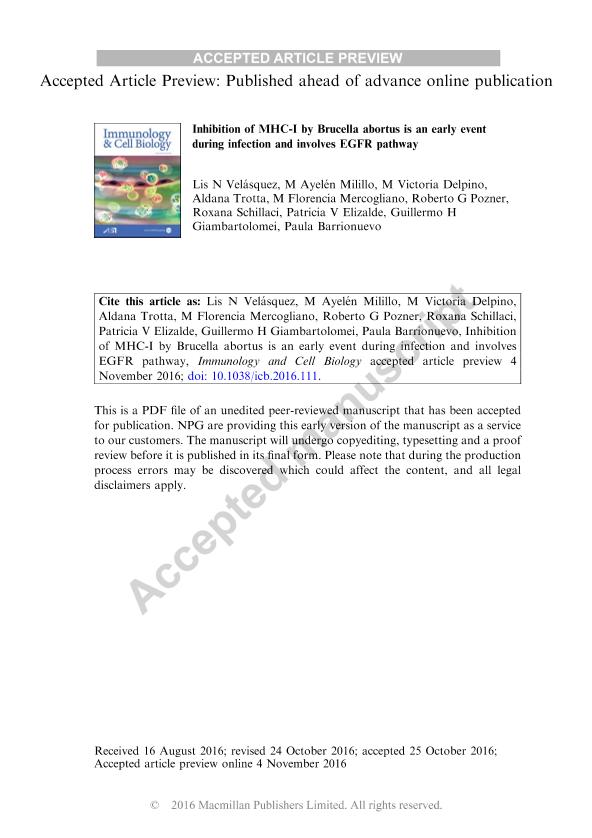Artículo
Inhibition of MHC-I by Brucella abortus is an early event during infection and involves EGFR pathway
Velasquez, Lis Noelia ; Milillo, María Ayelén
; Milillo, María Ayelén ; Delpino, María Victoria
; Delpino, María Victoria ; Trotta, Aldana; Mercogliano, María Florencia
; Trotta, Aldana; Mercogliano, María Florencia ; Pozner, Roberto Gabriel
; Pozner, Roberto Gabriel ; Schillaci, Roxana
; Schillaci, Roxana ; Elizalde, Patricia Virginia
; Elizalde, Patricia Virginia ; Giambartolomei, Guillermo Hernan
; Giambartolomei, Guillermo Hernan ; Barrionuevo, Paula
; Barrionuevo, Paula
 ; Milillo, María Ayelén
; Milillo, María Ayelén ; Delpino, María Victoria
; Delpino, María Victoria ; Trotta, Aldana; Mercogliano, María Florencia
; Trotta, Aldana; Mercogliano, María Florencia ; Pozner, Roberto Gabriel
; Pozner, Roberto Gabriel ; Schillaci, Roxana
; Schillaci, Roxana ; Elizalde, Patricia Virginia
; Elizalde, Patricia Virginia ; Giambartolomei, Guillermo Hernan
; Giambartolomei, Guillermo Hernan ; Barrionuevo, Paula
; Barrionuevo, Paula
Fecha de publicación:
04/2017
Editorial:
Nature Publishing Group
Revista:
Immunology and Cell Biology
ISSN:
0818-9641
e-ISSN:
1440-1711
Idioma:
Inglés
Tipo de recurso:
Artículo publicado
Clasificación temática:
Resumen
Brucella abortus is able to persist inside the host despite the development of potent CD8+ T-cell responses. We have recently reported the ability of B. abortus to inhibit the interferon-γ-induced major histocompatibility complex (MHC)-I cell surface expression on human monocytes. This phenomenon was due to the B. abortus-mediated retention of MHC-I molecules within the Golgi apparatus and was dependent on bacterial viability. However, the implications of bacterial virulence or replicative capacity and the signaling pathways remained unknown. Here we demonstrated that the B. abortus mutant strains RB51 and virB10- are able to inhibit MHC-I expression in the same manner as wild-type B. abortus, even though they are unable to persist inside human monocytes for a long period of time. Consistent with this, the phenomenon was triggered early in time and could be observed at 8 h postinfection. At 24 and 48 h, it was even stronger. Regarding the signaling pathway, targeting epidermal growth factor (EGF) receptor (EGFR), ErbB2 (HER2) or inhibition of tumor necrosis factor-α-converting enzyme, one of the enzymes which generates soluble EGF-like ligands, resulted in partial recovery of MHC-I surface expression. Moreover, recombinant EGF and transforming growth factor-α as well as the combination of both were also able to reproduce the B. abortus-induced MHC-I downmodulation. Finally, when infection was performed in the presence of an extracellular signal-regulated kinase 1/2 (Erk1/2) inhibitor, MHC-I surface expression was significantly recovered. Overall, these results describe how B. abortus evades CD8+ T-cell responses early during infection and exploits the EGFR-ERK signaling pathway to escape from the immune system and favor chronicity.
Palabras clave:
Brucella
,
Immuneevation
,
Mhc-I
,
Egfr
Archivos asociados
Licencia
Identificadores
Colecciones
Articulos(IBYME)
Articulos de INST.DE BIOLOGIA Y MEDICINA EXPERIMENTAL (I)
Articulos de INST.DE BIOLOGIA Y MEDICINA EXPERIMENTAL (I)
Articulos(IMEX)
Articulos de INST.DE MEDICINA EXPERIMENTAL
Articulos de INST.DE MEDICINA EXPERIMENTAL
Citación
Velasquez, Lis Noelia; Milillo, María Ayelén; Delpino, María Victoria; Trotta, Aldana; Mercogliano, María Florencia; et al.; Inhibition of MHC-I by Brucella abortus is an early event during infection and involves EGFR pathway; Nature Publishing Group; Immunology and Cell Biology; 95; 4; 4-2017; 388-398
Compartir
Altmétricas



